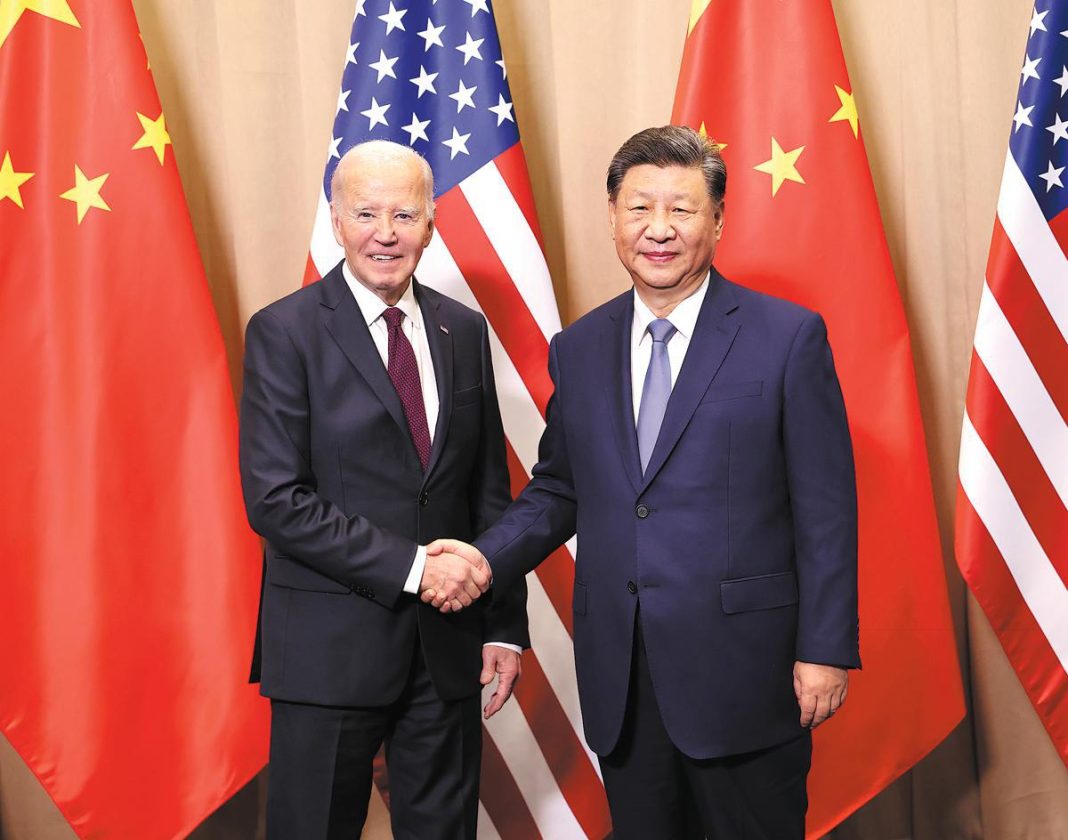BEIJING: Charting a smooth transition of China-US ties, taking stock of the policy legacy and underlining Beijing’s policy consistency were highlights of the third summit between President Xi Jinping and United States President Joe Biden, observers said.
Prior to their meeting on Saturday in Lima, Peru, Xi and Biden had met face-to-face in Bali, Indonesia, in 2022 and in San Francisco last year.
On Saturday, Beijing and Washington agreed to “continue to stabilize China-US relations, and ensure a smooth transition of the relationship”, the Foreign Ministry said.
Both leaders said they believe that “their meeting has been candid, profound and constructive, and they expressed their willingness to stay in contact”, the ministry added. Xi and Biden agreed to maintain the momentum of communication and strengthen macroeconomic policy coordination.
They also reviewed the important progress since their San Francisco meeting in dialogue and cooperation on counternarcotics, climate change, artificial intelligence and people-to-people exchanges.
Diao Daming, a professor of US studies at Renmin University of China’s School of International Relations, said, “The third Xi-Biden summit further plays the role as a navigator and a stabilizer for the ties, and taking stock of the policy legacy and lessons over the past four years and beyond is part of Beijing’s clear, constructive solution for driving the relations’ growth in the future.
“Whoever takes charge of the US’ China policy should respect lessons from the past, face up to the US’ international duties, act on the very interests of the American people and respond to global expectations for better well-being,” Diao said.
Xi’s underlining of Beijing’s consistency in US policy will help respond to the potential uncertainties that may be brought about by Washington in the future, he added.
On Saturday, Xi said that China and the US should keep exploring the right way for two major countries to get along well with each other, realize long-term, peaceful coexistence, and inject more certainty and positive energy into the world.
Xi also said that neither decoupling nor supply-chain disruption is the solution, and “small yard, high fences” is not what a major country should do. Citing the lessons from the two countries’ diplomatic ties over the past 45 years, Xi said that if the two sides regard each other as rivals and pursue vicious competition, they “will roil the relationship or even set it back”. He identified four red lines for China that must not be challenged: the Taiwan question, democracy and human rights, China’s path and system, and China’s development right. “Major-country competition should not be the underlying logic of the times; only solidarity and cooperation can help humanity overcome current difficulties,” Xi said. Biden said the US-China relationship is the most important bilateral relationship in the world, not just for the two peoples, but also for the future of the world.
He underscored that the US does not seek a new Cold War, it does not seek to change China’s system, its alliances are not targeted against China, it does not support “Taiwan independence”, it does not seek conflict with China, and it does not see its Taiwan policy as a way to compete with China.
The US will stay committed to the one-China policy and is prepared to enhance communication and dialogue with China during the US’ presidential transition period to have a better perception of each other and responsibly manage differences, he said.
He added that the two sides support each other’s host roles for 2026 — China will host the APEC meeting that year and the US will host the G20 meeting — demonstrating “what we can do for the two peoples when we work together”.
On specific policy agenda items, Xi stated China’s positions on Taiwan, economic and trade ties, science and technology, cybersecurity, the South China Sea, the Ukraine crisis and the Korean Peninsula. –The Daily Mail-China Daily news exchange item





